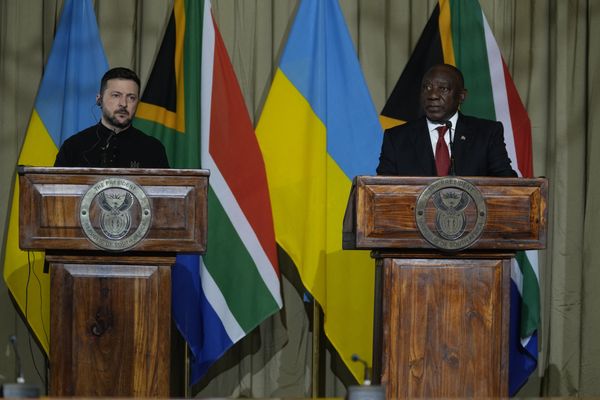Although President Donald Trump issued sweeping pardons for defendants who faced charges related to events that occurred at or near the Capitol building on Jan. 6, 2021, the cases aren’t fully going away just yet.
Amid an effort to dismiss hundreds of cases following Trump’s proclamation Monday for more than 1,500 defendants, the Justice Department has run into several snags and received some pushback from judges who handled hundreds of those cases.
There are lingering questions about how to handle some charges and convictions in the cases not directly related to the underlying charges, such as not showing up for court dates.
Two judges in the U.S. District Court for the District of Columbia have dismissed cases, but they declined to go along with the part of the Trump proclamation that requires a case to be dismissed “with prejudice,” meaning it could not be brought again.
Judge Amy Berman Jackson on Thursday wrote that would disrespect the police officers assaulted on Jan. 6. Jackson still granted a motion to dismiss the case against Peter Harding, who was indicted on charges of knowingly entering restricted Capitol grounds and violent entry or conduct in the Capitol.
“No stroke of a pen and no proclamation can alter the facts of what took place on January 6, 2021,” Jackson wrote. “When others in the public eye are not willing to risk their own power or popularity by calling out lies when they hear them, the record of the proceedings in this courthouse will be available to those who seek the truth.”
Judge Tanya Chutkan did the same in a case against John Banuelos, who was charged with firing a gun outside the Capitol during the attack, writing that the pardons could not change the truth of the attack.
“It cannot whitewash the blood, feces, and terror that the mob left in its wake,” Chutkan wrote in an order. “And it cannot repair the jagged breach in America’s sacred tradition of peacefully transitioning power.”
Outside of judicial resistance to the dismissals, some of the complications come as the DOJ has to deal with charges for conduct related to the case but not related to the actual attack, University of Missouri law professor Frank Bowman said.
“The backstop in all of this is that it seems really unlikely that, at least with respect to any case that hasn’t been finalized with a conviction, I think the DOJ is quite likely to do everything in its power to simply dump these cases,” Bowman said.
Several defendants have been accused of failing to appear for court proceedings. Initially, the acting U.S. Attorney for the District of Columbia, Ed Martin, wrote that the Justice Department would not seek “at this time” to dismiss charges related to failing to appear for court proceedings for defendants Olivia Michelle Pollock and Joseph Daniel Hutchinson III.
However, later Thursday, the DOJ moved to dismiss those charges as well.
Bowman said it is likely that the Justice Department will drop charges against defendants accused of other crimes related to their initial charges, even if they weren’t directly covered by the pardons.
“Will the DOJ continue these cases? Almost certainly not. Trump would have conniptions, as would the MAGA base,” Bowman said.
Once a conviction has been obtained though, it will be up to a federal judge to decide whether the pardon applies to the crime at hand, Bowman said.
Those issues have also come up in the remaining cases. Judge John D. Bates asked the Justice Department to explain whether the pardon extended to the alleged violations of release conditions by defendant Darrell Neely, who was accused of violating his release conditions after being sentenced to a 28-month prison term after being convicted on five misdemeanor counts on Jan. 6.
In another case, Judge Colleen Kollar-Kotelly questioned the Justice Department’s move to dismiss an obstruction of justice charge against Nicholas L. Kennedy.
Kollar-Kotelly said the DOJ should file a brief in the case “clarifying whether it regards Kennedy’s admitted attempt to obstruct a grand jury investigation as ‘conduct related to the events at or near the United States Capitol on January 6, 2021.’”
Martin Reddish, a law professor at Northwestern Law School, said that Trump could, if he wanted to, short-circuit any disagreement he has with the decisions of the judges handling the cases by issuing another pardon.
“He could just correct the misunderstanding and make it clearer,” Reddish said. The pardon power, he said, is “bottom line: extremely broad.”
Bowman said there’s another reason the pardons may stick around in the public zeitgeist; it’s possible that some of the hundreds of people covered by the pardons could go on to commit more crimes.
“In the previous political universe we all lived in until pretty recently, sure there was a political cost to pardoning people and they go out and do bad stuff,” Bowman said.
On Thursday, House Minority Leader Hakeem Jeffries, D-N.Y., spoke to reporters in front of a poster depicting a news story about the rearrest of Daniel Ball, of Florida, on gun charges following his pardon.
Jeffries and other Democrats have sought to tie Republicans to Trump’s pardons, which included hundreds of people charged with or convicted of violent crimes.
“It is shameful that House Republicans have embraced the freeing of violent felons who brutally beat police officers on Jan. 6,” Jeffries said.
The post Trump’s pardon of Jan. 6 defendants hits minor court snags appeared first on Roll Call.







